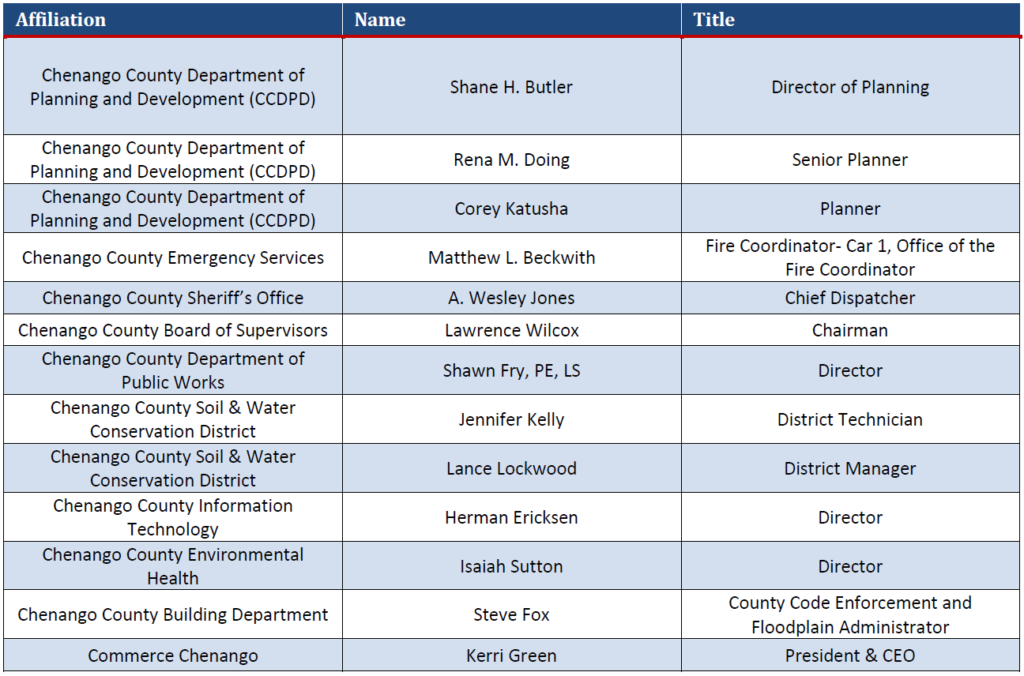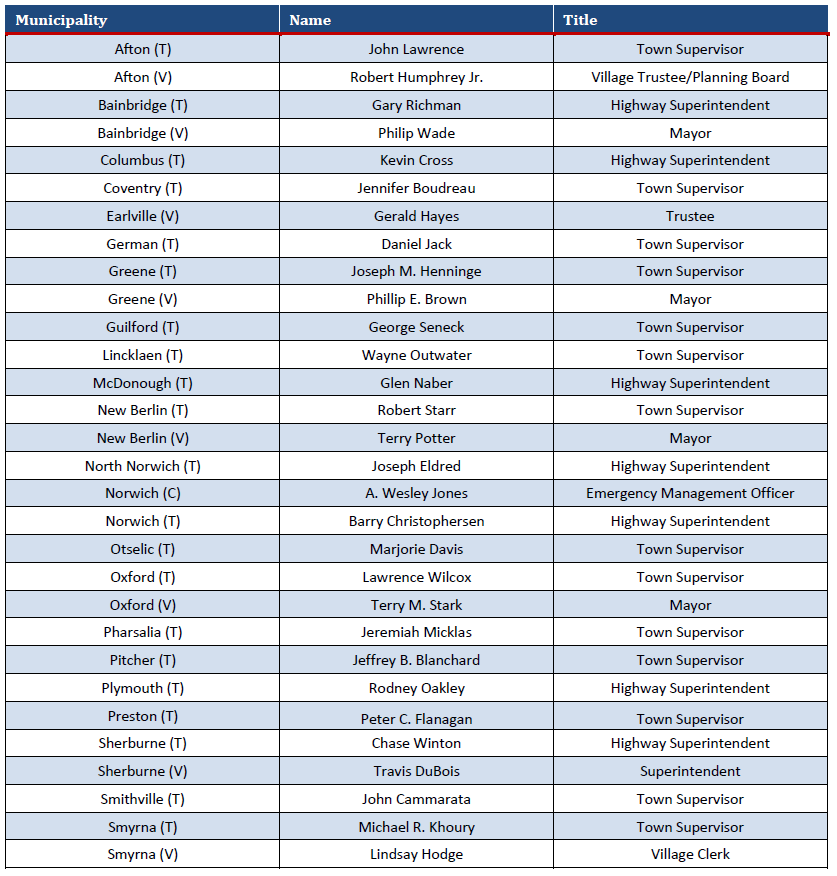About the Project
Purpose
Chenango County’s Department of Planning & Development is leading the update of the Chenango County Hazard Mitigation Plan (HMP) for the County and its jurisdictions. This plan is an opportunity to detail a variety of potential hazards that could affect some or all of our residents and will also allow the County and the participating jurisdictions to be eligible for future mitigation funding from the Federal Emergency Management Agency (FEMA). The goal of this plan is to identify projects that can reduce damages from future natural and non-natural hazards. The plan will include a risk assessment and a hazard mitigation strategy. The study will focus on existing buildings and potential future development, infrastructure, and critical facilities that might be impacted. Critical Facilities are those facilities considered critical to the health and welfare of the population and that are especially important following a hazard. Critical facilities include essential facilities, transportation systems, lifeline utility systems, high-potential loss facilities, and hazardous material facilities.
Steering Committee
The Chenango County Hazard Mitigation Plan Steering Committee’s purpose is to guide the planning process and provide input as needed for the content of the plan. Specifically, the Steering Committee was charged with the following:
- Providing guidance and oversight of the planning process on behalf of the general planning partnership.
- Attending and participating in Steering Committee meetings.
- Assisting with the development and completion of certain planning elements, including:
- Reviewing and updating the hazards of concern.
- Developing a public and stakeholder outreach program.
- Assuring that the data and information used in the plan update process are the best available.
- Reviewing and updating the hazard mitigation goals.
- Identifying and screening of appropriate mitigation strategies and activities.
- Reviewing and commenting on plan documents prior to submission to NYS DHSES and FEMA.
Members of the 2020 HMP Steering Committee are as follows:

Planning Partnership
The Planning Partnership is a combined group consisting of the Steering Committee and at least one representative from each municipality. Municipal Representatives provide direct input to jurisdictional-specific sections (annexes) of the plan regarding capabilities, hazard event history, and project development. The jurisdictions in Chenango County have differing levels of capabilities and resources available to apply to the plan update process, and further, have differing exposure and vulnerability to the natural hazard risks being considered in this plan. Chenango County’s intent was to encourage participation by all-inclusive jurisdictions and to accommodate their specific needs and limitations while still meeting the intents and purpose of plan update participation. Such accommodations have included the establishment of a Steering Committee, engaging a contract consultant to assume certain elements of the plan update process on behalf of the jurisdictions, and the provision of additional and alternative mechanisms to meet the purposes and intent of mitigation planning. All jurisdictions in Chenango County have submitted a written Letter of Intent to Participate in the HMP Update.
Members of the Planning Partnership are as follows:

Scope
During the planning process, the Planning Partnership will actively be involving private sector, non-profit, and other community partners in the planning process. The approach is consistent with the “Whole Community Approach,” which seeks to involve the entire community in disaster and hazard planning.
Objectives
The objectives of the Chenango County HMP planning process are:
- Provide the public opportunities throughout the plan development and drafting process to provide input.
- Conduct a thorough risk assessment using the most recent disaster data and information.
- Formulate hazard mitigation goals, objectives, and actions as they relate to reducing loss of life and property from natural and human-caused hazards.
- Obtain state and federal approval of the HMP.
Hazard Mitigation Planning Process Summary
This hazard mitigation planning process involves eight phases:

PHASE 1: Organize the Resources Relevant studies, plans, and reports are collected along with communications resources that allow the public to be involved throughout the planning process. A planning team is “built” that consists of municipal representatives, and local and regional stakeholders.
PHASE 2: Update the Plan’s Risk Assessment
Potential locations and geographic extent of natural and human-caused hazards that can affect the county are identified along with their impacts and future probability. Scientific and anecdotal evidence of past events is collected and evaluated, and the hazards and losses the community has sustained are ranked high to low.
PHASE 3: Public Involvement During this phase, a comprehensive public engagement strategy will be developed to educate and increase awareness of the HMP planning process. This will include a series of social media posts, project information brochure, and public meetings.
PHASE 4: Mitigation Strategy
Local capabilities in emergency management, the National Flood Insurance Program (NFIP), planning and regulatory authority, administrative and technical knowledge, finances, and education and outreach are assessed. Goals, objectives, and actions and are evaluated and updated as needed. The planning team defines appropriate mitigation techniques, and chooses and prioritizes mitigation actions and projects in the mitigation strategy.
PHASE 5: Determine Plan Maintenance Process
The HMP is a living document that must be regularly reviewed, updated, and maintained. A schedule including responsible parties or agencies involved with monitoring, evaluating, and updating the plan during its 5-year cycle is prepared. A process for integrating the updated Mitigation Strategy into existing plans and reports is outlined and a plan for continued public outreach and participation will also be determined.
PHASE 6: Plan Update and Deliverables The draft plan will be developed and assembled to meet all federal and state regulations.
PHASE 7: Obtain Mitigation Plan Approval and Adoption
The draft plan is made available for public comment then submitted to the New York State Division of Homeland Security and Emergency Services (NYSDHSES) and the Federal Emergency Management Agency (FEMA) for review and approval. Once the plan has been determined to meet all state and federal requirements and receives official approval, it should be adopted by all participating jurisdictions.
PHASE 8: Project Management Project management will be performed throughout the planning process by Tetra Tech. Tetra Tech will work closely with the County to oversee the project from start to finish.
